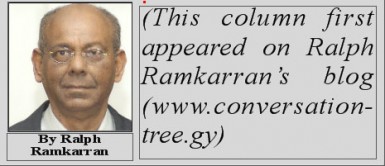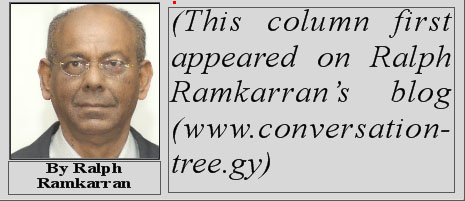Two weeks ago a government team led by the President Ramotar visited Cotton Tree, West Coast Berbice. This area is populated by descendants of indentured labourers and has a substantial land problem. The President described it thus: “…historic problems which has (sic) been in the making for a long time whereby lands were given out to people and some of them sold out but no title was passed to them while some died out and some migrated and in the meantime, over the years, it was festering and beginning to cause some problems in the community itself.”
The President announced the government’s decision to resolve the problems of the community. Under the Land Registry Act the area would be declared a “registration area.” When this is done the parcels of land occupied would be surveyed.
The President announced that the government will allocate the sum of $46 million for the survey. Upon completion of the survey the Land Court will then receive applications for title, hold sittings at which evidence of occupation will be taken and ownership granted.
 Minister Robert Persaud accompanied the President and in his presentation recognized that the same problems existed elsewhere. He said that similar exercises will be undertaken in other parts of the country.
Minister Robert Persaud accompanied the President and in his presentation recognized that the same problems existed elsewhere. He said that similar exercises will be undertaken in other parts of the country.
The President was describing at Cotton Tree the same problems which affect the descendants of slaves who occupy lands without titles. Minister Robert Persaud could have been referring to these problems when he recognized that they existed elsewhere.
In July 2007 the National Assembly debated a motion in the name of Ms Deborah Backer of the opposition PNCR on the African Slave Trade and Slavery to mark the bicentenary of the abolition of the African Slave Trade. The motion called for a recognition of the debt that all Guyanese owe to our African ancestors and for an African Lands Commission to be established to determine the issue of ancestral land rights of African Guyanese.
The impassioned debate lasted for two days. The government supported the motion but unwisely and to its discredit opposed the establishment of the African Lands Commission. At the end of the debate the government used its majority to amend the motion to omit the portion relating to the African Lands Commission.
The debate revealed that three categories of lands were occupied by emancipated Africans outside of the plantations after 1838. These were proprietary villages, communal villages and crown lands. In proprietary villages individual lots were sold for which separate titles were held. In communal villages lands were jointly owned so that villagers did not have individual titles. No indication was given as to the nature of occupation of crown lands. These do not give rise to ‘ancestral’ rights, but that was never the issue.
Serious problems have developed in relation to lands purchased by Africans in the post emancipation period whatever the form of initial ownership. These resulted from lack of resources and access to legal services. Thousands of acres of lands which were acquired by liberated slaves and were the subject of joint, or communal ownership or even of individual ownership, are now occupied by their descendants, but they do not have titles for the same or similar reasons that the descendants of indentured labourers in Cotton Tree do not have titles. Ms Backer described the problems in similar terms to President Ramotar.
If problems affecting the descendants of indentured labourers can be resolved in the way proposed by the President, why can’t similar problems be resolved for the descendants of newly emancipated Africans? In the debate the government did not offer to invoke the Land Registry Act to assist the descendants of liberated slaves as it is now doing for the residents of Cotton Tree.
The public will be looking closely to see whether lands occupied without titles by the descendants of liberated slaves will be addressed in a similar manner or whether such programmes will be confined only to the descendants of indentured labourers.
Land titling is not only necessary to address historical problems. It is also a matter of substantial economic importance and if the government would have paused in 2007, or even now, to consider its implications, it would not have hesitated to address this matter for all Guyanese by announcing a considered, national policy.
The owner of land can sell it and invest the proceeds, or use it as security to borrow to invest, or to improve living conditions. The occupier without title, especially if poor, can do absolutely nothing with the land which normally has no infrastructure, except cultivate it for a bare livelihood. It would be no surprise if a study of rural poverty shows that it is more intense in those areas where a substantial number of the residents do not have title to their lands.
Giving title to lands which are occupied or even distributing land more aggressively would be an effective way to generate more economic activity in innumerable ways and to increase economic growth.
One of Guyana’s most important and under-utilised resources is its land which is occupied without title or is sitting idle.










